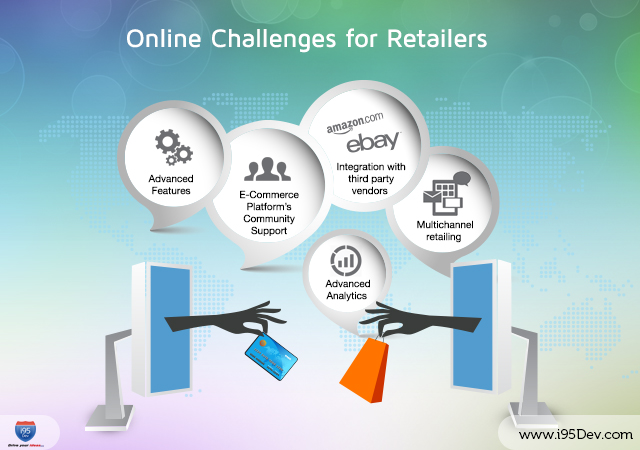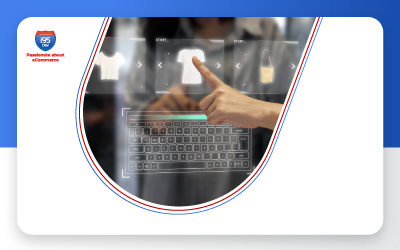Online Challenges
For Retailers

We have highlighted below a few challenges in detail
Advanced Features
Customers now expect you to deliver more convenience, more information and services such as in-depth product information, a more intuitive and capable search experience, personalization, easy order entry, and shipment tracking. Your primary goal is to increase product browsing, improve order conversion rates and the overall service performance of an e-commerce site. To meet this goal and to stay ahead of the growing customer demands, your e-commerce cart needs specific features such as advanced catalog management, multiple wish lists, persistent shopping cart, different product types such as simple, configurable products and bundled products, personalization features like custom shopping list, assisted shopping etc.
Integration with Third party Vendors
Retail business has changed drastically in recent years as third party marketplaces like eBay/Amazon continue to capture a larger share of consumers’ online shopping experience. Businesses can also leverage these marketplaces to increase sales, give their products and their brand an increased global presence and multiply sales. To maximize these benefits, retailers and wholesalers need integration between business software and e-commerce solutions that eases listing, managing inventory and fulfilling orders. Anything less risks costly service failures and the loss of business.
Multichannel Retailing
Multichannel selling enables a customer to transact with a retailer or wholesaler via several sales channels. These channels include brick-and-mortar stores, mail-order, online, mobile, social media, and direct-to-home. Most retailers face challenges in managing product data as it is widely dispersed, stored in multiple places, in multiple formats and often duplicated. Only the accurate and updated product information will help the companies selling in the multichannel environment. So to successfully compete in this environment, your online store must be integrated with a robust ERP andCRM systems to synchronize your orders, customers, products, and inventory data. Such a configuration provides your sales team, warehouse managers, and e-commerce managers a consolidated view of all B2B and B2C operations. Just as crucial to your customers, it also will provide a consistent shopping experience across all sales channels.
Looking to learn more about multichannel retailing? Join our on-demand webinar to get valuable insights and practical tips.
Advanced Analytics
To stay upfront in the multichannel space, an e-commerce platform should be equipped with advanced analytics. It is crucial for your store to not only attract customers but keep them coming back for more. With advanced web analytics, coupled with your marketing and sales plan, you will be able to track your customers’ habits and interests, allowing you to tailor promotions designed to increase customer engagement and sales. Offers like these also help build customer loyalty and can measure customer lifetime value. Current stats will help you effectively target the most profitable customer segments with the best promotional tactics.
E-commerce Platform’s Community Support
An e-commerce solution should support a global community of partners and developers to better address technical issues faced. If something goes wrong, the platform should notify retailers immediately about the problem, along with the source of the error, to speed up its resolution. Also, an e-commerce store should be built on an open-source platform, which is very scalable and widely adopted, making it easier to work on and find necessary technical resources.
How i95dev can help?
For more information on our products & solutions feel free to contact us at: info@i95dev.com, http://www.i95dev.com/contact/ or give us a call at 301.760.7499.
For more details on improving your retail strategy and overcoming intricate business challenges, watch our on-demand webinar.




